CALIFORNIA AIRPORTS PARTNERSHIP
AIR QUALITY IMPROVEMENT PROJECT
Commercial airports are sources of high levels of economic activity and emissions. Sources of air pollution at airports are broad-based: aviation, and ground activities on the airside (ground support equipment, airfield operations, aircraft fueling, emergency operations, etc.) and on the landside (taxis, shuttles, parking operations, passenger pick-up/drop-off, cargo delivery, etc.).
Since airports are under strict federal control, opportunities to address facility-wide air pollution are often guided by the Federal Aviation Administration (FAA). Emissions from aviation sources are controlled solely by the FAA and are outside the purview of the airports themselves. Therefore, any efforts to reduce air pollution at airports must focus solely on ground sources.
Over the past five years, the major commercial airports in California (Los Angeles International, San Francisco International, San Diego International, Oakland International, Minetta-San Jose International, Sacramento Metropolitan, Orange County, Burbank, Long Beach, and Fresno-Yosemite) have met informally to address common problems and share best practices as they relate to environmental issues. The group asked CALSTART to advise and assist them in matters relating to cleaner ground transportation options.
In 2008 CALSTART spearheaded a group submission of a U.S. Environmental Protection Agency Diesel Emissions Reduction Act (DERA) proposal. This proposal sought grant funds to retrofit and/or replace vehicles that are used in airport operations and by firms that are licensed to operate at the airports.
In February 2009 the group was successful in winning a DERA grant in the amount of $895,827. CALSTART administered the grant funds to the participating airports, monitored participant performance, and collected data for project reporting purposes.
Overall this project resulted in lifetime reductions of criteria pollutant emissions of 38.2 tons and CO2 emission reductions of 179.2 tons. Lifetime diesel reductions equate to 197,625 gallons.
Project Description
Each of the participants included in this project conducted separate and different retrofit/replacement actions.
Oakland International Airport
OAK retrofitted five (5) 1999 model year Gillig 35-foot shuttle buses equipped with Cummins ISC 280 horsepower engines with diesel particulate filters. These buses are used to service the airport’s remote parking lots.
San Diego International Airport
SAN retrofitted (2) on-field, off-road vehicles with particulate filters: Two Tennant sweepers, one a 1990 MY model 95AA, and the other a 1998 MY model 830, both with 65 hp Perkins Diesel engines;
San Francisco International Airport
SFO undertook an ambitious program that contains a mix of fuel price differential and diesel retrofit devices.
- Utilize B20 biodiesel in place of the ultra-low sulfur diesel fuel currently used. They purchased 110,000 gallons of B20 biodiesel during the project period with a cost differential of $0.41 per gallon.
- Retrofit 10 on-field pieces of equipment with particulate filters including backhoes, cranes, excavators, and mowers.
Southwest Airlines
California’s largest intra-state carrier, Southwest re-powered nine 1993 MY diesel pushback tugs. Six of the tugs—stationed at Los Angeles International Airport—with new Tier 3 diesel engines. Three additional pushback tugs—stationed at San Jose-Minetta International Airport—were totally refurbished and the aging diesel engines were removed and replaced with electric motors.Check out the video from Southwest highlighting these conversions:
Events
Finally, two outreach events were conducted for airport stakeholders including airport staff, airline station managers, and ground-based transportation licensees. These two events—one held at San Francisco Airport and the other at Ontario Airport—were attended by more than 250 people.
